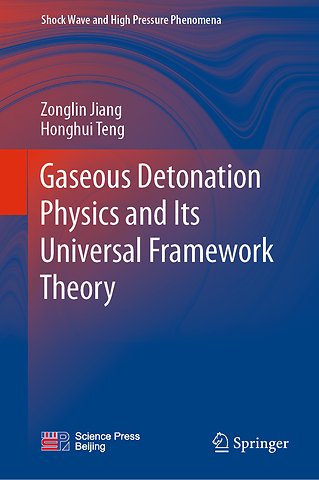Gaseous Detonation Physics and Its Universal Framework Theory
Gebonden Engels 2022 9789811970016Samenvatting
This book highlights the theories and research progress in gaseous detonation research, and proposes a universal framework theory that overcomes the current research limitations. Gaseous detonation is an extremely fast type of combustion that propagates at supersonic speed in premixed combustible gas. Being self-sustaining and self-organizing with the unique nature of pressure gaining, gaseous detonation and its gas dynamics has been an interdisciplinary frontier for decades. The research of detonation enjoyed its early success from the development of the CJ theory and ZND modeling, but phenomenon is far from being understood quantitatively, and the development of theories to predict the three-dimensional cellular structure remains a formidable task, being essentially a problem in high-speed compressible reacting flow. This theory proposed by the authors’ research group breaks down the limitation of the one-dimensional steady flow hypothesis of the early theories, successfully correlating the propagation and initiation processes of gaseous detonation, and realizing the unified expression of the three-dimensional structure of cell detonation. The book and the proposed open framework is of high value for researchers in conventional applications such as coal mine explosions and chemical plant accidents, and state-of-the-art research fields such as supernova explosion, new aerospace propulsion engines, and detonation-driven hypersonic testing facilities. It is also a driving force for future research of detonation.
Specificaties
Lezersrecensies
Inhoudsopgave
<p>1.2 Explosion, deflagration and detonation waves</p>
<p>1.3 Methodology of gaseous detonation research</p>
1.4 Critical physical phenomena of gaseous detonation<p></p>
<p> </p>
<p>Chap. 2 Mathematical equations and computational methods</p>
<p>2.1 Fundamental theories of gaseous detonation</p>
2.2 Mathematical and physical models<p></p>
<p>2.3 Governing equations and computational methods</p>
<p>2.4 Multi-dimensional simulation of detonation and its analysis</p>
<p> </p>
Chap. 3 Classical theories of gaseous detonations and dynamic parameters<p></p>
<p>3.1 Chapman–Jouguet theory</p>
<p>3.2 Zel'dovich–von Neumann–Döring model</p>
<p>3.3 Weak initiation through deflagration to detonation transition</p>
<p>3.4 Direct initiation through strong ignition source</p>
<p>3.5 SWACER theory of weak and strong initiations</p>
<p>3.6 Dynamic parameters and its discussion</p>
<p> </p>
<p>Chap. 4 Cellular detonation features and experimental observations</p>
<p>4.1 Multi-wave detonation fronts and cellular features</p>
<p>4.2 Structural evolution of propagating cellular detonation</p>
4.3 Reflection and diffraction of cellular detonation<p></p>
<p>4.4 Bifurcation models of cylindrical cellular detonation</p>
<p>4.5 Propagation of irregular detonations</p>
<p> </p>
Chap. 5 Universal framework theory for initiation and propagation of regular gaseous detonation <p></p>
<p>5.1 Introduction</p>
<p>5.2 Physical mechanism of hot spot initiation</p>
<p>5.3 Combustion reaction zone and its evolution</p>
<p>5.4 Critical initiation state and characteristic parameters</p>
<p>5.5 Critical propagation state and statistical features of detonation cells </p>
<p>5.6 Averaged cell length and half-cell rule</p>
5.7 Ignition delayed time and its correlation with cell length<p></p>
<p>5.8 Application of universal framework theory</p>
<p>5.9 Remarks on universal framework theory</p>
<p> </p>
Chap. 6 Structures and stationary rules of oblique detonations<p></p>
<p>6.1 Conservation laws and polar analysis of oblique detonations</p>
<p>6.2 Initiation structure of wedge-induced oblique detonation waves</p>
<p>6.3 Multi-wave structures and surface instability</p>
<p>6.4 Oblique detonation waves in realistic inflow conditions</p>
<p>6.5 Effects of rear expansion wave derived from finite-length wedges</p>
<p>6.6 Effects of blunt body on the initiation</p>
<p> </p>
<p>Chap. 7 Engineering applications of gaseous detonation phenomena</p>
<p>7.1 Thermal analysis of detonation-based combustion process</p>
<p>7.2 Propulsion technologies based on detonation waves</p>
7.3 Gaseous detonation driven high-enthalpy shock tunnels<p></p>
Rubrieken
- advisering
- algemeen management
- coaching en trainen
- communicatie en media
- economie
- financieel management
- inkoop en logistiek
- internet en social media
- it-management / ict
- juridisch
- leiderschap
- marketing
- mens en maatschappij
- non-profit
- ondernemen
- organisatiekunde
- personal finance
- personeelsmanagement
- persoonlijke effectiviteit
- projectmanagement
- psychologie
- reclame en verkoop
- strategisch management
- verandermanagement
- werk en loopbaan

